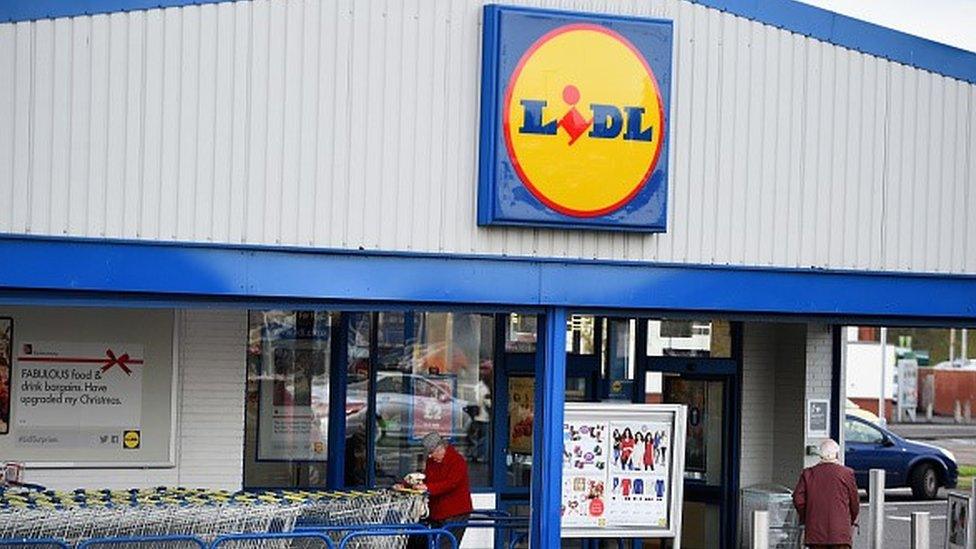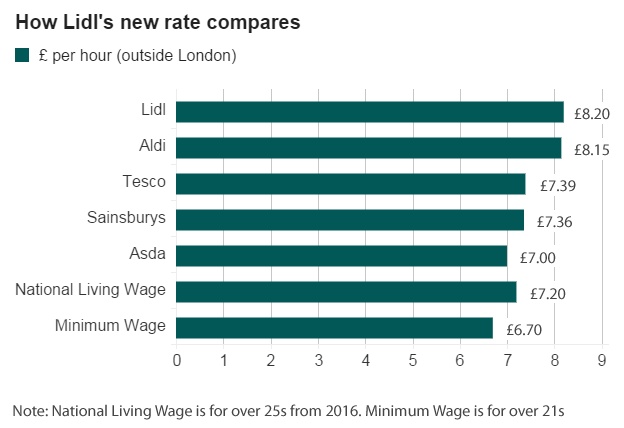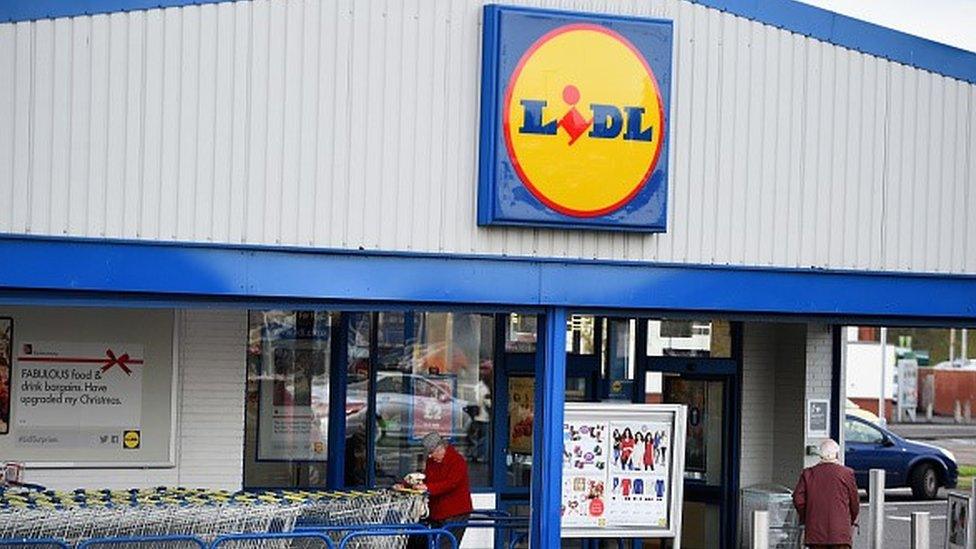Lidl to pay recommended living wage
- Published

Lidl has said it will become the first UK supermarket to implement the minimum wage as recommended by the Living Wage Foundation.
From October, Lidl UK employees will earn a minimum of £8.20 an hour across England, Scotland and Wales, and £9.35 an hour in London, the supermarket said.
However, the pay rise will not apply in Northern Ireland.
The Foundation will announce a change in its recommended rates in November.
The rate is different from the National Living Wage as set out in the Budget.
Lidl said that if the Living Wage Foundation raised its recommended rate in its annual announcement in November, Lidl would adjust its minimum wage accordingly.
Currently, Lidl pays its staff a minimum of £7.30 an hour and £8.03 an hour inside London.
The Living Wage Foundation's current recommended minimal hourly rate is £7.85, and £9.15 inside London.
The National Living Wage as required by the UK government, which was set out in George Osborne's July Budget, is set to be £7.20 an hour from April 2016 for people aged over 25.
Lidl said its new pay rate would amount to an average wage increase of £1,200 a year, "with 53% of Lidl UK's 17,000 workforce and all age brackets benefiting from the rise".
News of the impending pay rise was welcomed, with many tweeting their support for the German discount supermarket.
Lidl in Northern Ireland said it had increased wages in August "in line with the proposed living wage for Northern Ireland".
However, it has not yet disclosed the minimum rate it pays in Northern Ireland.
'Commitment to staff'
The chief executive of Lidl UK, Ronny Gottschlich, said: "Lidl employees will be amongst the best paid in the supermarket sector."
He said the company wanted to share its "success" with the staff.
It now had 5.5 million customers every week and planned to expand.
"Recently we announced we could easily imagine another 280 stores in London alone and between 1,200 and 1,500 stores in our store portfolio. "
"There aren't any patches where we can say we don't want to expand anymore. There is potential in almost every single town." Mr Gottschlich added.
The director of the Living Wage Foundation, Rhys Moore, told the BBC: "We are thrilled. We've been working with and trying to persuade the retail sector to commit to pay the living wage rates rather than National Minimum Wage [now called the National Living Wage].
"None of the big four supermarkets currently pay the living wage rates, and the BRC [British Retail Consortium] are very behind the curve on this."
For its part, the BRC told the BBC: "Whatever approach retailers take to their total reward packages, the real key to raising more people out of low pay will rest in increasing productivity."
The Scottish Cabinet secretary for fair work, Roseanna Cunningham, welcomed Lidl's move.
"I am very pleased to see that such a large supermarket has taken this important step," she said.
"Paying the Living Wage will have a significant effect on the lives of hundreds of staff in Scotland."
Position of strength
Richard Perks, retail director at consultants Mintel, told the BBC that Lidl's success in recent years had put it into a position to upstage its rivals.
"Lidl's profits must have risen very sharply in the UK during the last few years so it has the headroom to do this."
"The big four supermarkets are going the other way. They are all losing market share, they are all under pressure, they are all seeing markets decline. They will be struggling to do this now and if they did they would have to put up prices."
However, Mr Perks added that was somewhat hard to tell how well Lidl was doing because it was "very sensitive about its finances".

Sainsbury's responded by saying its benefits were comparable, because Lidl did not pay staff for time spent taking breaks.
It said that if breaks were included, one of its full-time employees on its new standard hourly rate of £7.36 would earn about £12 a week less than a Lidl employee on the new rate of £8.20.
In addition, Sainsbury's said it also gave staff bonuses amounting to £50m last year.
Asda, Morrisons and Aldi also pay for breaks.
Market leader Tesco does not pay for breaks, but it said it paid one of the highest hourly rates in retail, of £7.39.
In a statement, Tesco said: "We firmly believe in offering colleagues a total reward package and our benefits include a 10% colleague discount, shares scheme and pension, which we know they really value."
Asda will pay a standard hourly rate of £7 an hour from 1 October, while at Aldi it is £8.15.
Morrisons is still concluding this year's pay round.
The Living Wage Foundation's rate is an informal benchmark, not a legally enforceable minimum level of pay.
It is calculated by academics as the level of pay that will give workers enough for a basic standard of living.
- Published18 September 2015

- Published18 September 2015

- Published16 September 2015

- Published1 April 2016
